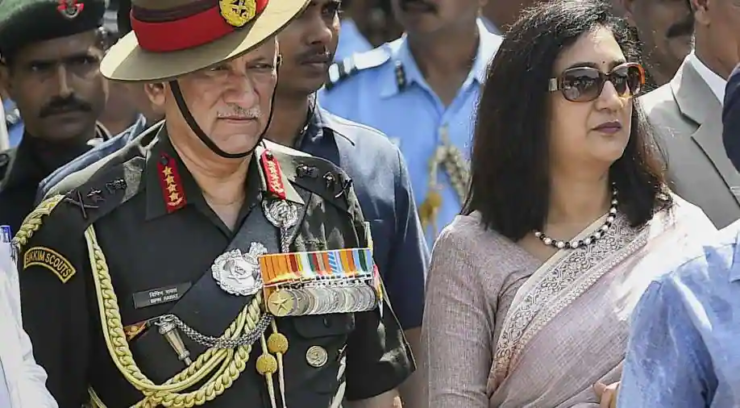
New Delhi. Just a month short of two years, the country’s first Chief of Defence Staff (CDS) General Bipin Rawat and his wife Madhulika met a tragic and untimely death when the helicopter they were travelling in crashed near Coonoor in Tamil Nadu. This created a massive void at a time when a CDS was need of the hour considering the prevailing tension along the Sino-Indian border and the Indo-Pakistan front.
The death of General Rawat who was first and only choice of Prime Minister Narendra Modi for this most powerful post has indeed come as a rude shock. Prime Minister Modi had taken the nation by surprise when on August 15, 2019 he announced the appointment of a CDS from the ramparts of the Red Fort. Within three months, General Rawat who was to retire as the Chief of Army Staff in end of 2019, was appointed as the first CDS.
With the preliminary exercise having begun to zero in on General Rawat’s successor as Army Chief General Manoj Mukund Naravane, what is going to be crucial for the successor is that he should have a proven track record of delivery and has Prime Minister Narendra Modi’s implicit trust to deliver on the agenda of defence reforms. It assumes importance since defence reform is an agenda which is a top priority for the Prime Minister and General Rawat had been very close to the prime minister in his thinking on the subject of defence reforms was concerned.
General Rawat in his brief tenure of one year, 11 months had held one-on-one meetings with Prime Minister Modi at his 7, Lok Kalyan Marg office. At these unscheduled meetings, called at very short notice roughly once a month, the CDS briefed the PM on a wide range of issues, not necessarily confined to defence matters, and gave him a progress report on his drive to bring about an integration of the services.
One of the major factors which would matter tremendously for his successor would be to carry forward the ambitious reform of the armed forces into integrated theatre commands, for which General Rawat had set ambitious targets. In this regard, the dice surely appears to be rolling in favour of the current Army Chief General Naravane who is due to retire in April 2022. One of the major factors weighing in favour of General Naravane is that he had worked under General Rawat and succeeded him as the 28th Army chief.
Besides he is the senior most among the three Chiefs and that one of the key recommendations of experts headed by Lt General D.B. Shekatkar in 2015 was that the first two CDS should be from the Army. In the present day scenario, one of the key factors weighing in favour of General Naravane to be appointed as the CDS is the prevailing tension along the borders with China and Pakistan.
However, according to reports, a set of between four and six candidates—is believed to have been sent to the government and a decision is expected soon. The Cabinet Committee on Security (CCS), which laid down the procedure for the CDS’s selection in 2019, suggested a list of six serving three- and four-star officers.
As the topmost defence official and single-point interface between the military and the political leadership, the CDS is a sensitive political appointment. Ever since the post of CDS had been suggested by the Arun Singh task force in 2001, it had been buried by the system. While Vajpayee’s government came closest to appointing the CDS in 2001 (then navy chief Admiral Sushil Kumar was a forerunner), it stopped short of doing so. It created the office of the CDS, an HQ Integrated Defence Staff (IDS), but left it headless. The UPA shelved it for the decade it was in power because of the Congress party’s somewhat unfounded fears of a coup.
General Rawat as then army chief was the Chairman CoSC and the senior most service chief, which made his step-up into the CDS’s office a logical conclusion. This seems to be the case even now with the present army chief. But as with the announcement of the post of CDS itself, only one man knows for sure.
General Rawat took over as the 27th Army Chief on December 31, 2016 and as the first CDS on January 1, 2020. As he stepped down as the Army chief after three years of tenure and before he turned 62, his tenure as CDS was till March 2023. The age limit for the CDS’s post is 65 years with no fixed tenure defined.
The CDS wears several hats, which include Secretary of the Department of Military Affairs (DMA) in the Defence Ministry, permanent Chairman Chiefs of Staff Committee, and the Principal Advisor to the Defence Minister.
After the appointment of the CDS, the armed forces were brought under the ambit of the DMA, which also deals with works relating to the three Services, and with procurement exclusive to the Services, except capital acquisitions which remains with the Department of Defence. The broad mandate of the CDS includes bringing about “jointness” in “operations, logistics, transport, training, support services, communications, repairs and maintenance of the three Services, within three years of the first CDS assuming office”.
While General Rawat had set out an ambitious plan for the roll out of the theatre commands, the process was delayed due to differences among the Services and objections on some aspects from the Indian Air Force. The task now falls on the next CDS to build consensus and take the reorganisation process forward.









